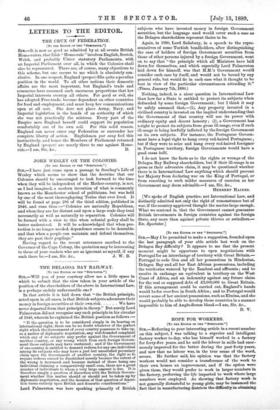THE DELAGOA BAY RA.TLWAY.
[To THE EDITOR OY THE " SPECTATOR:] SITC,—Will you of your courtesy allow me a little space in which to submit that the view taken in your article of the position of the shareholders of the above in International Law, is a perhaps unduly unfavourable one'?
In that article it is laid down that "the British principle, acted upon in all cases, is that British subjects adventure their
money in foreign securities at their own risk We have never departed from that principle in theory." But surely Lord Palmerston did not recognise any such principle in his circular of 1848, whereinhe explained the British position as follows :— " If the question is to be considered simply in its bearing on international right, there can be no doubt whatever of the perfect right which the Government of every country possesses to take up, as a matter of diplomatic negotiation, any well-founded oomplaint which any of its subjects may prefer against the Government of another country, or any wrong which from such foreign Govern- ment those subjects may have sustained ; and if the Government of one country is entitled to demand redress for any one individual among its subjects who may have a just but unsatisfied pecuniary claim upon the Government of another country, the right so to require redress cannot be diminished merely because the extent of the wrong is increased, and because instead of there being one individual claiming a comparatively small sum, there are a great number of individuals to whom a very large amount is due. It is therefore simply a question of discretion with the British Govern- ment whether this matter should or should not be taken up by diplomatic negotiation, and the decision of that question of discre- tion turns entirely upon British and domestic considerations."
Lord Palmerston was here speaking primarily of British subjects who have invested money in foreign Government securities, but the language used would cover such a case as the Delagoa shareholders represent theirs to be.
Again, in 1880, Lord Salisbury, in a speech to the repre- sentatives of some Turkish bondholders, after distinguishing the case of holders of foreign Government securities from those of other persons injured by a foreign Government, went on to say that "the principle which all Ministers have laid down for themselves, and which especially Lord Palmerston laid down for himself, was that H.M.'s Government would consider each ease by itself, and -would not be bound by any general rule, but would do in each case what it thought to be best in view of the particular circumstances attending it." (Tines, January 7th, 1880.) Nothing, indeed, is a nicer question in International Law than how far a State is entitled to protect its subjects when defrauded by some foreign Government ; but I think it may be safely assumed that,—(1), Any property invested in a civilised country is invested on the implied understanding that the Government of that country will use its power with ordinary equity and decent honesty ; (2), a Government has a right to protect its subjects from gross ill-usage, even if such ill-usage is being lawfully inflicted by the foreign Government on its own subjects. For instance, the Portuguese Govern- ment have a legal right to hang every red-haired Portuguese ; but if they were to seize and hang every red-haired foreigner in Portuguese territory, foreign Governments would have a good cams belli.
I do not know the facts as to the rights or wrongs of the Delagoa Bay Railway shareholders, but if their ill-usage is as gross as their advocates claim, it may be questioned whether there is in International Law anything which should prevent her Majesty from declaring war on the King of Portugal, or from resorting to such milder measures of coercion as her Government may deem advisable.—I am, Sir, &c., HERBERT HAINES.
[We spoke of English practice, not International Law, and distinctly admitted not only the right of remonstrance but of war, if the country aggrieved thought the matter large enough. What we contend is, that the Government cannot guarantee British investments in foreign countries against the foreign State, any more than against private thieves or swindlers.— ED. Spectator.]


































 Previous page
Previous page